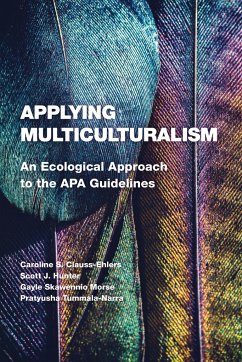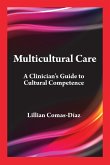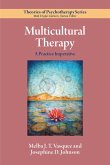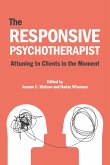Caroline S Clauss-Ehlers, Scott J Hunter, Gayle Skawennio Morse, Pratyusha Tummala-Narra
Applying Multiculturalism
An Ecological Approach to the APA Guidelines
Caroline S Clauss-Ehlers, Scott J Hunter, Gayle Skawennio Morse, Pratyusha Tummala-Narra
Applying Multiculturalism
An Ecological Approach to the APA Guidelines
- Broschiertes Buch
- Merkliste
- Auf die Merkliste
- Bewerten Bewerten
- Teilen
- Produkt teilen
- Produkterinnerung
- Produkterinnerung
This book expands on APA’s 2017 Multicultural Guidelines by exploring additional research and providing students and professionals with practical applications for clinical practice, teaching and training, research, and consultation.
Andere Kunden interessierten sich auch für
![Applying Decision Research to Improve Clinical Outcomes, Psychological Assessment, and Clinical Prediction Applying Decision Research to Improve Clinical Outcomes, Psychological Assessment, and Clinical Prediction]() David FaustApplying Decision Research to Improve Clinical Outcomes, Psychological Assessment, and Clinical Prediction78,99 €
David FaustApplying Decision Research to Improve Clinical Outcomes, Psychological Assessment, and Clinical Prediction78,99 €![Multicultural Care Multicultural Care]() Lillian Comas-DíazMulticultural Care87,99 €
Lillian Comas-DíazMulticultural Care87,99 €![Multicultural Therapy: A Practice Imperative Multicultural Therapy: A Practice Imperative]() Melba J. T. VasquezMulticultural Therapy: A Practice Imperative47,99 €
Melba J. T. VasquezMulticultural Therapy: A Practice Imperative47,99 €![The Responsive Psychotherapist The Responsive Psychotherapist]() The Responsive Psychotherapist79,99 €
The Responsive Psychotherapist79,99 €![Evidence-Based Practice in Clinical Hypnosis Evidence-Based Practice in Clinical Hypnosis]() Evidence-Based Practice in Clinical Hypnosis71,99 €
Evidence-Based Practice in Clinical Hypnosis71,99 €![Common Factors Therapy: A Principle-Based Treatment Framework Common Factors Therapy: A Principle-Based Treatment Framework]() Russell J. BaileyCommon Factors Therapy: A Principle-Based Treatment Framework53,99 €
Russell J. BaileyCommon Factors Therapy: A Principle-Based Treatment Framework53,99 €![The Ethical Lives of Clients The Ethical Lives of Clients]() William J DohertyThe Ethical Lives of Clients55,99 €
William J DohertyThe Ethical Lives of Clients55,99 €-
-
-
This book expands on APA’s 2017 Multicultural Guidelines by exploring additional research and providing students and professionals with practical applications for clinical practice, teaching and training, research, and consultation.
Hinweis: Dieser Artikel kann nur an eine deutsche Lieferadresse ausgeliefert werden.
Hinweis: Dieser Artikel kann nur an eine deutsche Lieferadresse ausgeliefert werden.
Produktdetails
- Produktdetails
- Verlag: American Psychological Association (APA)
- Seitenzahl: 333
- Erscheinungstermin: 19. September 2023
- Englisch
- Abmessung: 221mm x 157mm x 30mm
- Gewicht: 454g
- ISBN-13: 9781433832543
- ISBN-10: 1433832542
- Artikelnr.: 59082593
- Herstellerkennzeichnung
- Libri GmbH
- Europaallee 1
- 36244 Bad Hersfeld
- 06621 890
- Verlag: American Psychological Association (APA)
- Seitenzahl: 333
- Erscheinungstermin: 19. September 2023
- Englisch
- Abmessung: 221mm x 157mm x 30mm
- Gewicht: 454g
- ISBN-13: 9781433832543
- ISBN-10: 1433832542
- Artikelnr.: 59082593
- Herstellerkennzeichnung
- Libri GmbH
- Europaallee 1
- 36244 Bad Hersfeld
- 06621 890
Caroline S. Clauss-Ehlers, PhD, ABPP, is a professor of psychology in the department of psychology at Long Island University-Brooklyn. Her research focuses on child and adolescent development with an emphasis on understanding cultural resilience and trauma within diverse community contexts. Dr. Clauss-Ehlers served as chair of the task force that developed APA’s 2017 Multicultural Guidelines. She received the 2014 American Counseling Association’s Exemplary Diversity Leadership Award and the 2018 Association of Multicultural Counseling and Development Distinguished Service Award for Exceptional Leadership and Devoted Service. She lives in New York City. Scott J. Hunter, PhD, is a professor of psychiatry and behavioral neuroscience and pediatrics at the University of Chicago. A licensed clinical psychologist and developmental psychologist, Dr. Hunter is the director of neuropsychology for UChicago Medicine and Comer Children’s Hospital. As a pediatric neuropsychologist, he manages clinical programs and conducts research regarding socioeconomic impact and functional status on children, adolescents, and emerging adults with a range of neurodevelopmental and medical conditions. Dr. Hunter coedited four books published by Cambridge University Press, including Executive Function and Dysfunction: Identification, Assessment, and Treatment and Pediatric Neuropsychological Intervention. Gayle Skawennio Morse, PhD, is a professor and the director of the Community Counseling Program at The Sage Colleges. Her research focuses on American Indian communities and examines the effects of toxic chemicals on human health and ethics and mental health treatment. Dr. Morse is the past president of the Society of Indian Psychologists, an APA fellow, and was awarded the APA Society for the Psychology of Women Section 6 Sweet Grass Award for dedication and professionalism in service. She is a member of the Akwesasne Kanien¿kehá¿ka (Mohawk) people, from whom she draws principles that guide her professionally. Pratyusha Tummala-Narra, PhD, is a professor of counseling, developmental, and educational psychology and director of doctoral training in counseling psychology at Boston College. Her research focuses on immigration, trauma, race, cultural competence, and psychoanalytic psychotherapy. She has chaired or served on multiple committees, including the Multicultural Concerns Committee and the APA Task Force on Revising the Multicultural Guidelines. Dr. Tummala-Narra is associate editor of the Asian American Journal of Psychology and Psychoanalytic Dialogues and senior psychotherapy editor of the Journal of Humanistic Psychology. She authored Psychoanalytic Theory and Cultural Competence in Psychotherapy and edited Trauma and Racial Minority Immigrants.
Foreword: The Last Page and Dreams of the Future and the Weight of the Past
Joseph E. Trimble
Acknowledgments
Part I. Foundations of Multicultural Practice
Chapter 1. An Introduction to the Multicultural Guidelines
Chapter 2. The Layered Ecological Model of the Multicultural Guidelines
Part II. A Bidirectional Model of Self-Definition and Relationships
Chapter 3. Recognizing the Fluidity and Complexity of Self-Identify and
Social Dynamics: Multicultural Guideline 1
Chapter 4. Understanding and Avoiding Psychologists’ Biases: Multicultural
Guideline 2
Part III. Understanding Community, School, and Family Context
Chapter 5. The Cultural Significance of Language and Communication:
Multicultural Guideline 3
Chapter 6. The Impact of Social Capital: Multicultural Guideline 4
Part IV. Considering the Institutional Impact on Engagement
Chapter 7. Recognizing Institutional Barriers and Systemic Marginalization:
Multicultural Guideline 5
Chapter 8. Promoting Culture-Centered Interventions and Advocacy:
Multicultural Guideline 6
Part V. Psychological Practice Within a Domestic and International Climate
Chapter 9. Understanding Globalization’s Impact on Psychology:
Multicultural Guideline 7
Chapter 10. The Intersection Between Development and Biosociocultural
Context: Multicultural Guideline 8
Part VI. Outcomes
Chapter 11. Conducting Culturally Informed Work in Psychology:
Multicultural Guideline 9
Chapter 12. Applying a Strength-Based Approach to Psychology: Multicultural
Guideline 10
Part VII. Future Directions in Multicultural Psychology
Chapter 13. Where Do We Go From Here? Looking Towards 2027 in Multicultural
Psychology
Afterword
Lynn Pasquerella
References
Index
About the Authors
Joseph E. Trimble
Acknowledgments
Part I. Foundations of Multicultural Practice
Chapter 1. An Introduction to the Multicultural Guidelines
Chapter 2. The Layered Ecological Model of the Multicultural Guidelines
Part II. A Bidirectional Model of Self-Definition and Relationships
Chapter 3. Recognizing the Fluidity and Complexity of Self-Identify and
Social Dynamics: Multicultural Guideline 1
Chapter 4. Understanding and Avoiding Psychologists’ Biases: Multicultural
Guideline 2
Part III. Understanding Community, School, and Family Context
Chapter 5. The Cultural Significance of Language and Communication:
Multicultural Guideline 3
Chapter 6. The Impact of Social Capital: Multicultural Guideline 4
Part IV. Considering the Institutional Impact on Engagement
Chapter 7. Recognizing Institutional Barriers and Systemic Marginalization:
Multicultural Guideline 5
Chapter 8. Promoting Culture-Centered Interventions and Advocacy:
Multicultural Guideline 6
Part V. Psychological Practice Within a Domestic and International Climate
Chapter 9. Understanding Globalization’s Impact on Psychology:
Multicultural Guideline 7
Chapter 10. The Intersection Between Development and Biosociocultural
Context: Multicultural Guideline 8
Part VI. Outcomes
Chapter 11. Conducting Culturally Informed Work in Psychology:
Multicultural Guideline 9
Chapter 12. Applying a Strength-Based Approach to Psychology: Multicultural
Guideline 10
Part VII. Future Directions in Multicultural Psychology
Chapter 13. Where Do We Go From Here? Looking Towards 2027 in Multicultural
Psychology
Afterword
Lynn Pasquerella
References
Index
About the Authors
Foreword: The Last Page and Dreams of the Future and the Weight of the Past
Joseph E. Trimble
Acknowledgments
Part I. Foundations of Multicultural Practice
Chapter 1. An Introduction to the Multicultural Guidelines
Chapter 2. The Layered Ecological Model of the Multicultural Guidelines
Part II. A Bidirectional Model of Self-Definition and Relationships
Chapter 3. Recognizing the Fluidity and Complexity of Self-Identify and
Social Dynamics: Multicultural Guideline 1
Chapter 4. Understanding and Avoiding Psychologists’ Biases: Multicultural
Guideline 2
Part III. Understanding Community, School, and Family Context
Chapter 5. The Cultural Significance of Language and Communication:
Multicultural Guideline 3
Chapter 6. The Impact of Social Capital: Multicultural Guideline 4
Part IV. Considering the Institutional Impact on Engagement
Chapter 7. Recognizing Institutional Barriers and Systemic Marginalization:
Multicultural Guideline 5
Chapter 8. Promoting Culture-Centered Interventions and Advocacy:
Multicultural Guideline 6
Part V. Psychological Practice Within a Domestic and International Climate
Chapter 9. Understanding Globalization’s Impact on Psychology:
Multicultural Guideline 7
Chapter 10. The Intersection Between Development and Biosociocultural
Context: Multicultural Guideline 8
Part VI. Outcomes
Chapter 11. Conducting Culturally Informed Work in Psychology:
Multicultural Guideline 9
Chapter 12. Applying a Strength-Based Approach to Psychology: Multicultural
Guideline 10
Part VII. Future Directions in Multicultural Psychology
Chapter 13. Where Do We Go From Here? Looking Towards 2027 in Multicultural
Psychology
Afterword
Lynn Pasquerella
References
Index
About the Authors
Joseph E. Trimble
Acknowledgments
Part I. Foundations of Multicultural Practice
Chapter 1. An Introduction to the Multicultural Guidelines
Chapter 2. The Layered Ecological Model of the Multicultural Guidelines
Part II. A Bidirectional Model of Self-Definition and Relationships
Chapter 3. Recognizing the Fluidity and Complexity of Self-Identify and
Social Dynamics: Multicultural Guideline 1
Chapter 4. Understanding and Avoiding Psychologists’ Biases: Multicultural
Guideline 2
Part III. Understanding Community, School, and Family Context
Chapter 5. The Cultural Significance of Language and Communication:
Multicultural Guideline 3
Chapter 6. The Impact of Social Capital: Multicultural Guideline 4
Part IV. Considering the Institutional Impact on Engagement
Chapter 7. Recognizing Institutional Barriers and Systemic Marginalization:
Multicultural Guideline 5
Chapter 8. Promoting Culture-Centered Interventions and Advocacy:
Multicultural Guideline 6
Part V. Psychological Practice Within a Domestic and International Climate
Chapter 9. Understanding Globalization’s Impact on Psychology:
Multicultural Guideline 7
Chapter 10. The Intersection Between Development and Biosociocultural
Context: Multicultural Guideline 8
Part VI. Outcomes
Chapter 11. Conducting Culturally Informed Work in Psychology:
Multicultural Guideline 9
Chapter 12. Applying a Strength-Based Approach to Psychology: Multicultural
Guideline 10
Part VII. Future Directions in Multicultural Psychology
Chapter 13. Where Do We Go From Here? Looking Towards 2027 in Multicultural
Psychology
Afterword
Lynn Pasquerella
References
Index
About the Authors








